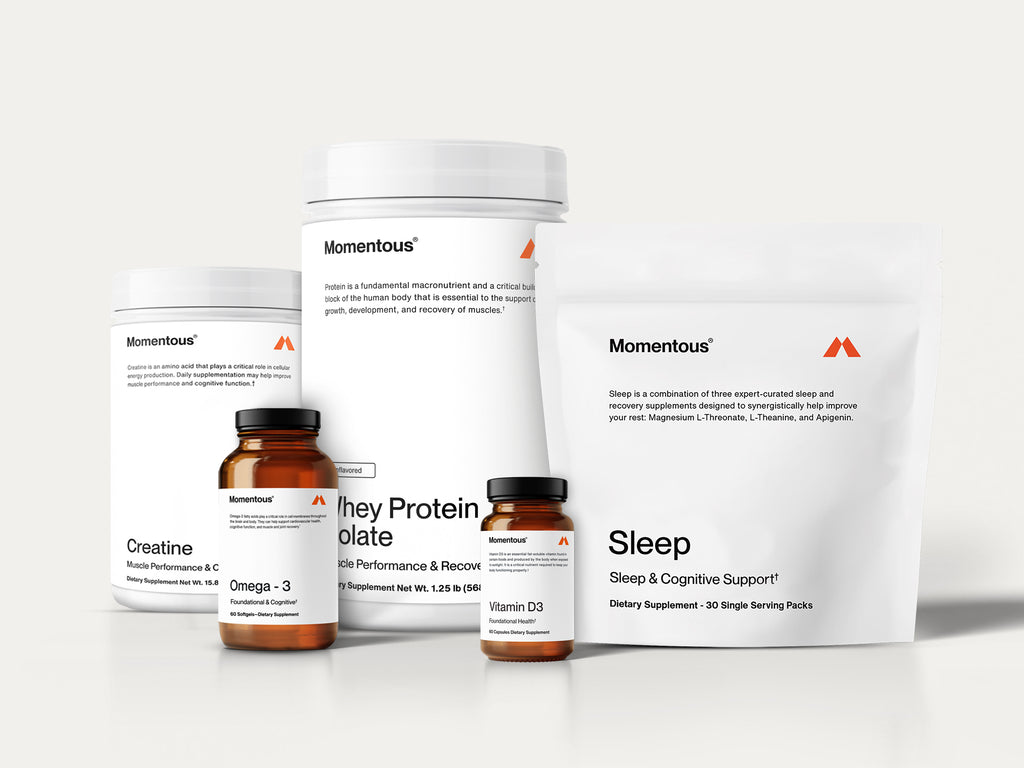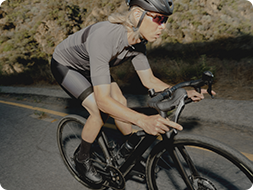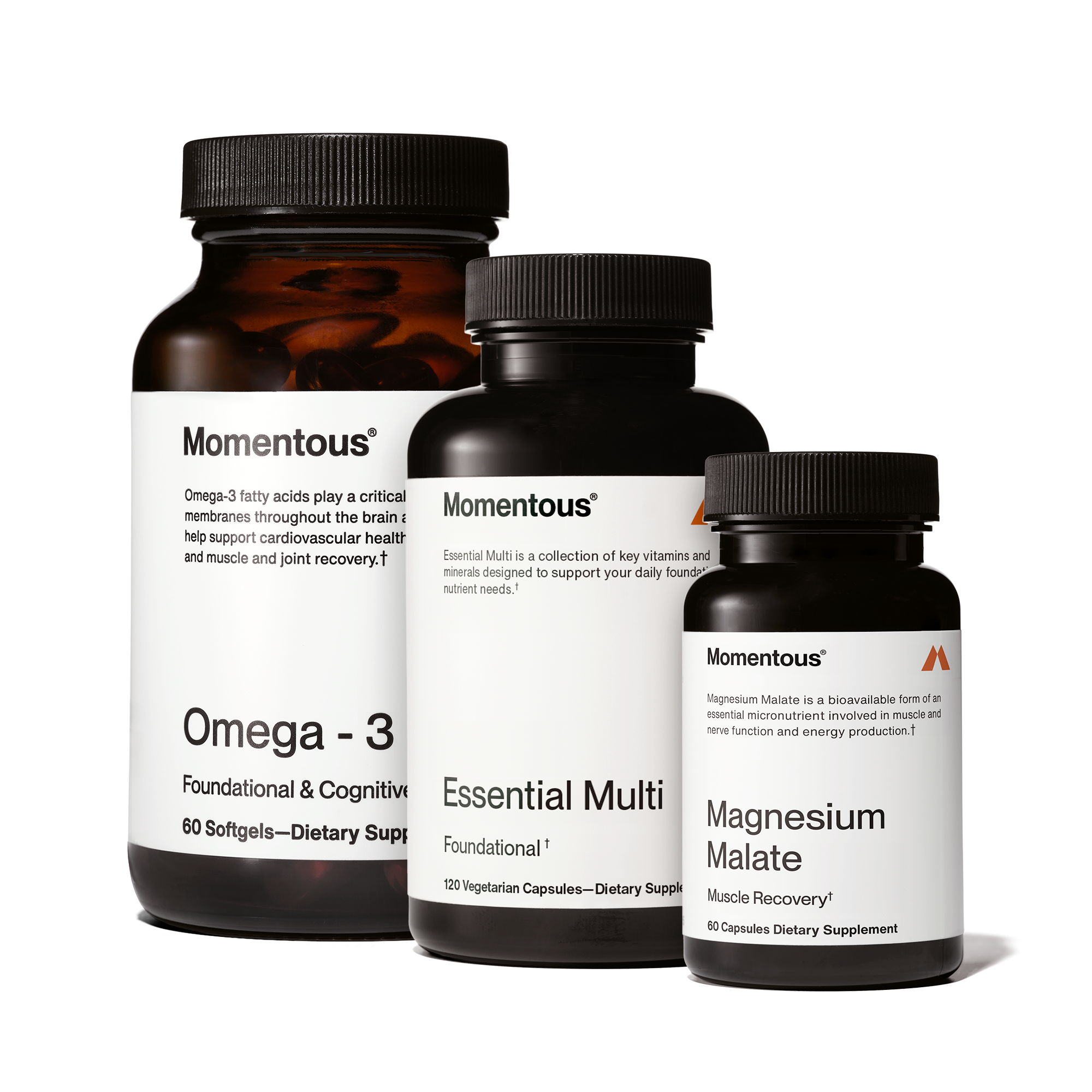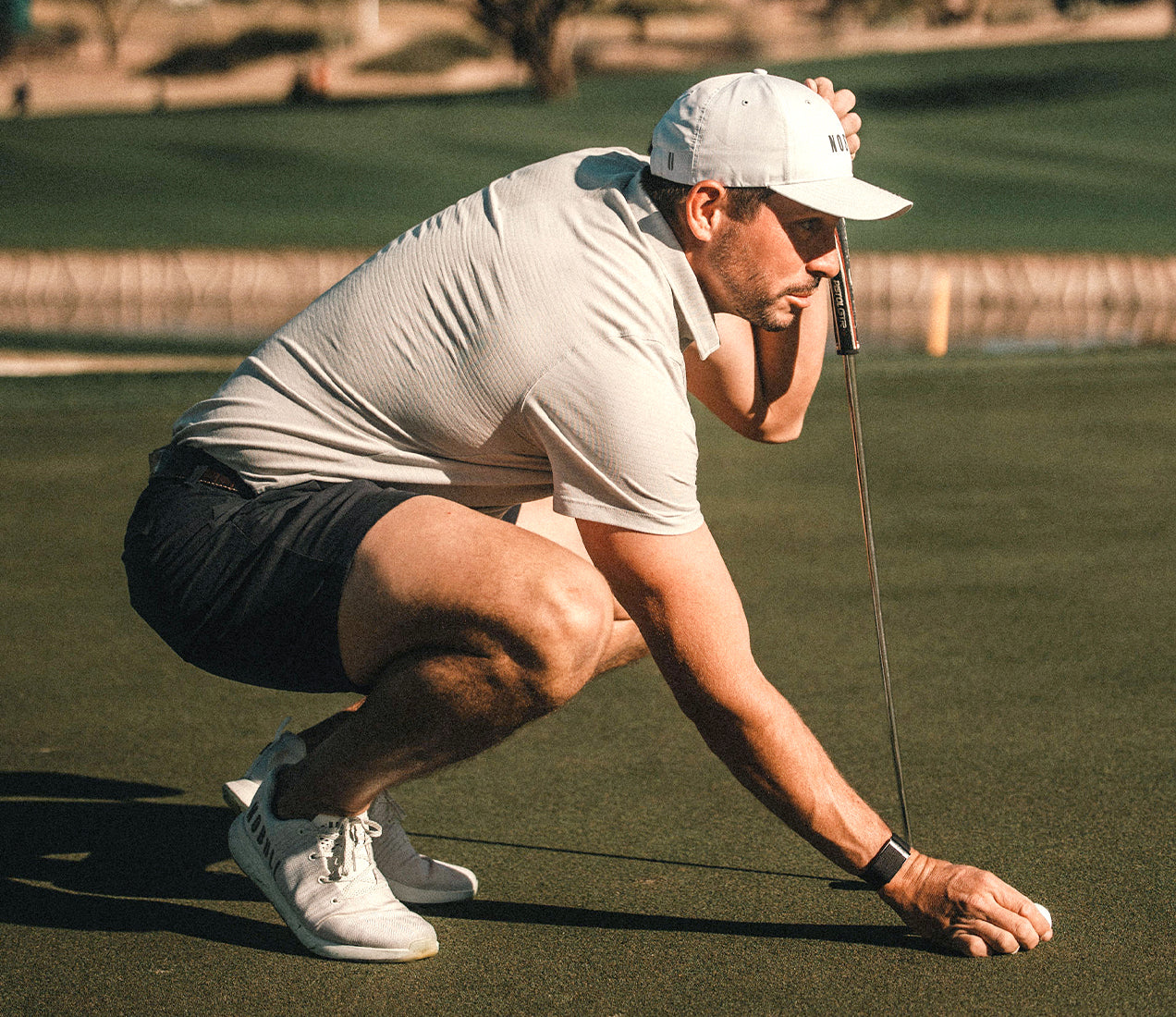Cognitive Function, Foundational Health, Muscle Recovery
Immune Function, Athletic Performance, Muscle Recovery, Joint Health, Cognitive Function, Sleep Quality
It's not uncommon to find people hitting the gym or pounding the pavement without a clear idea of what they're trying to achieve. Sure, not everyone needs a specific goal, but understanding the direction of your fitness journey can be a game-changer when it comes to motivation and progress tracking. Momentous Partner Dr. Andy Galpin is here to make things crystal clear by breaking down the various exercise adaptations and providing practical ways to test each of them. Get ready to be informed, educated, and empowered as we dive into this comprehensive guide designed to help you understand, assess, and elevate your fitness game.
Skill or Technique:
Learning to move more effectively
Boosting your skill level in exercise is all about honing your ability to move smoothly and effectively. To gauge your progress in this area, try taking a joint-by-joint approach. Focus on key joints like the shoulder, elbow, low back, hip, knee, and ankle. By evaluating these joints through various exercises, you can assess your symmetry, stability, awareness, and range of motion. As you dedicate time and effort to improving these aspects, you'll notice enhanced movement patterns and a reduced risk of injury, helping you feel more confident and capable in your workouts.
Speed:
Moving at a higher velocity or with a better rate of acceleration
Speed is a game-changer in many athletic endeavors, and stepping up your pace can dramatically elevate your competitive advantage. To get a clear picture of your speed, give the tried-and-true 40-yard dash a shot. Or get technical and use velocity transducers on a barbell during resistance workouts. Monitoring your progress in speed offers valuable insights into how your training routine impacts your overall performance. With this knowledge in hand, you'll be well-equipped to fine-tune your workouts for even greater success.
Power:
Speed multiplied by force
Power is the magic ingredient that turns good athletes into great ones, and it's born from the marriage of speed and force. To get a true sense of your power prowess, put yourself to the test with exercises like the broad jump and vertical jump. These tests will reveal how quickly and explosively you can summon force, giving you a window into your athletic potential. Keeping an eye on your power progress helps you understand your capabilities and empowers you to make smart adjustments to your training routine.
Force/Strength:
How effectively you can move something
Strength is the bedrock of fitness, the powerful force that drives you to new heights in your physical pursuits. To get a clear picture of your strength, try your hand at diverse tests like grip strength assessments, dead hangs, leg extensions, and goblet squat holds. These exercises will reveal your current strength prowess and illuminate areas ripe for improvement ensuring you're always moving forward, one powerful step at a time.
Muscle Hypertrophy:
How big your muscle is, muscle size
Muscle hypertrophy is about growing those muscles, boosting your strength, and building a body that makes heads turn. To keep tabs on your muscle gains, turn to body composition tests like DEXA scans or bioelectrical impedance analysis (BIA) – they'll paint a clear picture of your ever-evolving muscle mass. Understanding your muscle growth patterns can also empower you to optimize your workouts and achieve a well-rounded, strong, visually appealing physique.
Muscular Endurance:
How many reps in a row you can do, localized to specific muscles or muscle groups
Muscular endurance is your muscles' staying power – their ability to keep going when the going gets tough. Exercises like planks or push-ups offer a great way to measure your muscles' ability to resist fatigue and keep pumping out those reps. By assessing your muscular endurance, you'll better understand how your muscles handle prolonged stress and identify which areas may need a little extra attention. Plus, these tests shine a light on your overall fitness level, letting you adjust your training for improved endurance and peak physical performance.
Anaerobic Capacity:
Max heart rate, how much work you can do at max effort, global muscle fatigue
Anaerobic capacity is all about tapping into your body's ability to crush high-intensity work without relying on oxygen for fuel. It's a crucial aspect of fitness for athletes and enthusiasts who need to deliver short bursts of power and speed on the fly. To put your anaerobic capacity to the test, try out challenges like the Wingate or Bosco tests. These evaluations will help you measure your heart rate and overall fatigue levels during intense exercise, shedding light on your anaerobic prowess. Armed with this knowledge, you can customize your training program to target areas that need a boost, so you can truly unleash your inner powerhouse and excel in high-intensity activities.
Maximal Aerobic Capacity:
Max heart rate and true VO2 max, 8-15-min range
Maximal aerobic capacity is your body's ability to efficiently use oxygen during prolonged exercise. It's the secret sauce for endurance athletes and anyone looking to excel in activities that demand continuous effort. To get a clear picture of your aerobic prowess, try taking a VO2 max test, the Cooper 12-minute run test, or the Rockport 1-mile walk test. These assessments will help you gauge your heart rate and overall endurance during extended workouts, revealing valuable insights into your aerobic fitness. By understanding your maximal aerobic capacity, you can optimize your training and enhance your endurance for activities that demand prolonged effort.
Long Duration:
Sustained sub-maximal work (15+ minutes) with no breaks, changes, or drops (also known as steady state)
Long-duration exercises test your ability to keep going when the going gets tough. These workouts focus on your capacity to sustain consistent work output over extended periods without breaks, changes, or drops in intensity. Whether you're training for a marathon or just looking to improve your overall stamina, long-duration exercises like distance running or cycling can help you build the endurance you need. To measure your long-duration fitness, try maintaining a steady effort for 20+ minutes, relying solely on nasal breathing to encourage proper mechanics and a more efficient energy system. You'll gain invaluable insights into your overall endurance capabilities by keeping tabs on your performance during sustained sub-maximal work. This will empower you to advance your long-duration fitness.
It's not always necessary to have a specific goal in mind when it comes to improving your fitness. However, understanding your objectives and knowing how to test them can provide direction, motivation, and a means to track your progress. Improving these key areas improves our overall health, well-being, and movement quality. With the help of Momentous partner Dr. Andy Galpin, we now have access to invaluable tools to assess and enhance every aspect of our fitness journey. By embracing this comprehensive guide, you can take charge of your training, make informed decisions about your exercise regimen, and ultimately unlock your true potential.












